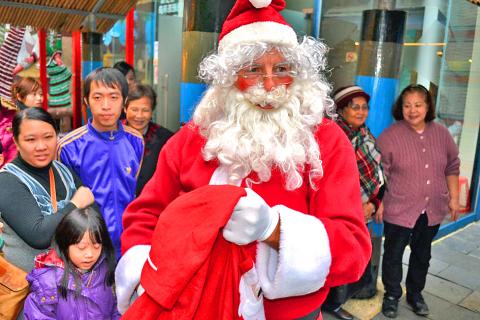Many of you are secretly pining for an iPhone 6 or a new boyfriend for Christmas (I want both). But a quick MRT ride to Xindian (新店), followed by a short bus ride to Wulai (烏來), you’ll realize that another world exists outside of first-world winter woes.
Many of us long-term expats have made Taiwan our “home” and as the holiday season rolls around, it’s time to give back to the country that has done so much for us. For the fourth year in a row, the Atayal Organization has co-organized a Christmas charity drive for the children of the Atayal community in Wulai.
Their efforts will culminate in a Christmas show outside of the Wulai Atayal Museum on Sunday. Santa will be handing out donated school supplies, clothes and candies to the local children. There will also be caroling and reveling.

Photo courtesy of Russ McClay
‘Spiritual home’
Tony Coolidge, the organization’s executive director, moved from the US to Taiwan five and a half years ago after the passing of his Atayal mother. Since then, he has considered Wulai his “spiritual home.”
“Coming to Taiwan to discover [my] roots has been part of my healing and reconnecting with a sense of family,” Coolidge told the Taipei Times. “I am always at peace when I’m amongst the mountains, clouds and butterflies — the Aboriginal people of Wulai are my family, so I feel a calling to do what I can to give back.”
The idea behind “Christmas in Wulai” originated from him and his friend Gary Smoke, who now serves as the organization’s director of international relations.
“Since I was already known in social circles as a Santa Claus every holiday season, Tony and I decided to join forces to give back to the Wulai Aboriginal community together,” said Smoke (spoiler alert: Smoke is Santa).
Smoke adds that “the Wulai children are especially touched when they see that people all over Taiwan and other parts of the world care enough about them to come to their hometown to share their love through their time, efforts and gifts.”
This year the focus has also been on cultural exchange, and, in particular, educating visitors about Aboriginal culture through the picturesque scenery and the museum’s exhibits. Smoke says that this year’s event will be a precursor to a future project the organization is developing to arrange more tours to Wulai for Taiwanese and foreigners to discover its local culture in a non-hyped-up touristy setting.
On the other hand, Coolidge adds, “our event adds a touch of international culture to the lives of local residents — it may help some children realize that there is a bigger world out there beyond Taiwan and inspire them in the future to go beyond the world they know.”

April 28 to May 4 During the Japanese colonial era, a city’s “first” high school typically served Japanese students, while Taiwanese attended the “second” high school. Only in Taichung was this reversed. That’s because when Taichung First High School opened its doors on May 1, 1915 to serve Taiwanese students who were previously barred from secondary education, it was the only high school in town. Former principal Hideo Azukisawa threatened to quit when the government in 1922 attempted to transfer the “first” designation to a new local high school for Japanese students, leading to this unusual situation. Prior to the Taichung First

Chinese Nationalist Party (KMT) Chairman Eric Chu (朱立倫) hatched a bold plan to charge forward and seize the initiative when he held a protest in front of the Taipei City Prosecutors’ Office. Though risky, because illegal, its success would help tackle at least six problems facing both himself and the KMT. What he did not see coming was Taipei Mayor Chiang Wan-an (將萬安) tripping him up out of the gate. In spite of Chu being the most consequential and successful KMT chairman since the early 2010s — arguably saving the party from financial ruin and restoring its electoral viability —

The Ministry of Education last month proposed a nationwide ban on mobile devices in schools, aiming to curb concerns over student phone addiction. Under the revised regulation, which will take effect in August, teachers and schools will be required to collect mobile devices — including phones, laptops and wearables devices — for safekeeping during school hours, unless they are being used for educational purposes. For Chang Fong-ching (張鳳琴), the ban will have a positive impact. “It’s a good move,” says the professor in the department of

Article 2 of the Additional Articles of the Constitution of the Republic of China (中華民國憲法增修條文) stipulates that upon a vote of no confidence in the premier, the president can dissolve the legislature within 10 days. If the legislature is dissolved, a new legislative election must be held within 60 days, and the legislators’ terms will then be reckoned from that election. Two weeks ago Taipei Mayor Chiang Wan-an (蔣萬安) of the Chinese Nationalist Party (KMT) proposed that the legislature hold a vote of no confidence in the premier and dare the president to dissolve the legislature. The legislature is currently controlled